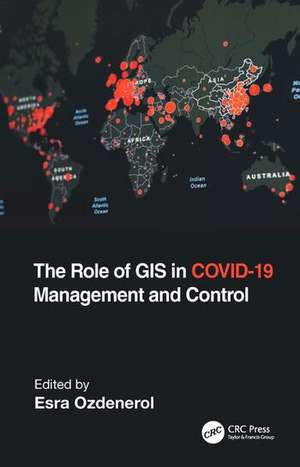The Role of GIS in COVID-19 Management and Control
Editat de Esra Ozdenerolen Limba Engleză Paperback – 19 dec 2024
| Toate formatele și edițiile | Preț | Express |
|---|---|---|
| Paperback (1) | 356.50 lei 3-5 săpt. | +22.15 lei 4-10 zile |
| Taylor & Francis Ltd. – 19 dec 2024 | 356.50 lei 3-5 săpt. | +22.15 lei 4-10 zile |
| Hardback (1) | 657.83 lei 6-8 săpt. | |
| CRC Press – 4 mai 2023 | 657.83 lei 6-8 săpt. |
Preț: 356.50 lei
Nou
Puncte Express: 535
Preț estimativ în valută:
68.23€ • 71.04$ • 57.66£
68.23€ • 71.04$ • 57.66£
Carte disponibilă
Livrare economică 17 februarie-03 martie
Livrare express 31 ianuarie-06 februarie pentru 32.14 lei
Preluare comenzi: 021 569.72.76
Specificații
ISBN-13: 9781032129761
ISBN-10: 103212976X
Pagini: 290
Dimensiuni: 233 x 156 x 17 mm
Greutate: 0.44 kg
Editura: Taylor & Francis Ltd.
ISBN-10: 103212976X
Pagini: 290
Dimensiuni: 233 x 156 x 17 mm
Greutate: 0.44 kg
Editura: Taylor & Francis Ltd.
Cuprins
1. The Role of GIS in COVID-19 Management and Control 2. Information Access as a Strategy to Overcome Health Inequities in the Context of COVID-19 3. Spatial Pattern of COVID-19 Positivity Rates in Indonesia during Local Restriction Phase: A Case study of Jakarta and Surabaya City 4. Investigating Spatial Relationships of Age and Comorbidities on COVID-19 Spread Using Geographically Weighted Regression 5. Spatiotemporal Patterns of Covid-19: A District-level Analysis of Kerala, India, 2020-2021 6. The 2020 Hurricanes, Internal Displacements and COVID-19 in Latin America and the Caribbean Countries: Lessons Learned for Disaster Risk Reduction 7. Hot Spot Tracker: Detecting and Visualizing the Types of Spatiotemporal Hot Spots of COVID-19 in the United States 8. Lifestyle Effects on the Risk of Transmission of COVID-19 in the United States: Evaluation of Market Segmentation Systems 9. A Bibliometric Review of Research on the Role of GIS in COVID19 Pandemic Control and Management: Science Mapping the Literature, 2020 – 2022 10. The Use of Geographic Information Systems to Shape COVID Policies Regarding Masking and Distancing with A Partially Vaccinated Population 11. Using GIS to Map Women’s Health, Well-being and Economic Opportunities in the Context of COVID-19 12. The Effects of Lifestyle on COVID-19 Vaccine Hesitancy in the United States: An Analysis of Market Segmentation 13. A Gendered Approach to Examining Pandemic Induced Livelihood Crisis in the Informal Sector: the Case of Female Domestic Workers in Titwala
Notă biografică
Dr. Esra Ozdenerol is a professor in the Department of Earth Sciences at the University of Memphis and has been since 2003. She is also affiliated with the Departments of Preventive Medicine and Health Outcome Policy of the University of Tennessee Health Science Center. She is the director of the GIS Certificate Program at the University of Memphis, and she directs the Spatial Analysis and Geographic Education Laboratory in the Department of Earth Sciences. Dr. Ozdenerol was the associate director of Benjamin L. Hooks Institute for Social Change at the University of Memphis from 2010 to 2013. She earned her doctorate degree in Geography in 2000 and her Master of Landscape Architecture degree in 1996 from the Louisiana State University. She earned her Bachelor of Science degree in Landscape Architecture and Agricultural Engineering from the University of Ankara, Turkey. Before joining the University of Memphis, she was an assistant professor of architecture at Florida International University in Miami from 2000 to 2003. Dr. Ozdenerol specializes in geographic information systems and has served as a technical consultant to various public, governmental, and international agencies. Her latest publications are on studies about spatial health inequalities. She has published two books with Taylor & Francis - Spatial Health Inequalities: Adapting GIS Tools and Data Analysis (2016) and Gender Inequalities: GIS approaches to Gender Analysis (2021).
